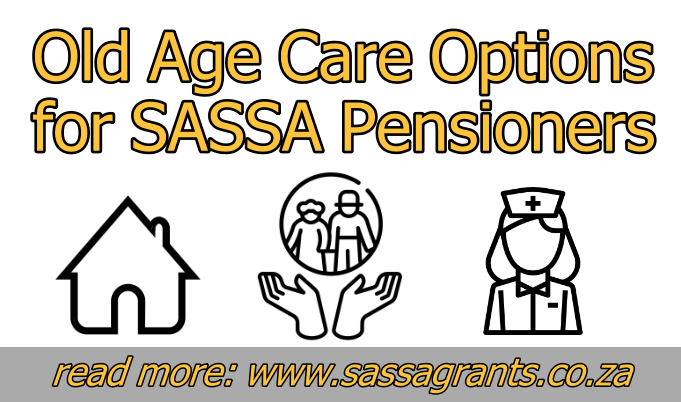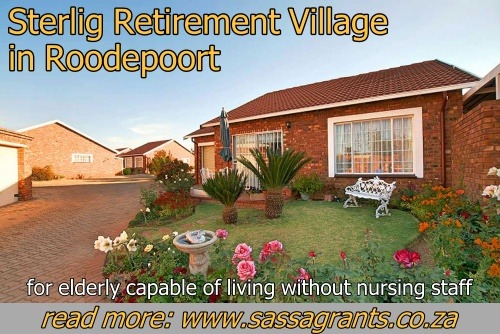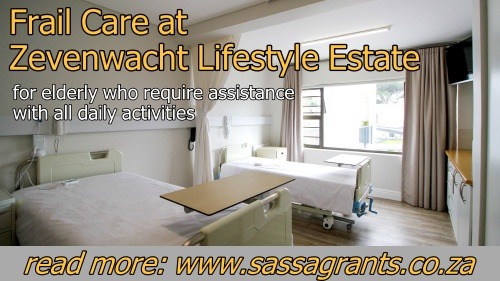Care Options for SASSA Pensioners and Elderly People
As people get older and reach the “pensioner” age, they may need assistance in performing basic daily tasks. If you are someone who cares for an older person, you may assist them in getting around to places and performing daily activities (like grocery shopping or cooking meals) however, there may also be instances where they need institutional eldercare.
To aid older people with their daily duties, there are a number of assistance options such as Independent Living, Assisted Living, Medicare, and Frail Care. For many, these terms may be confusing and scary, especially if you are researching various retirement options and want to make the best choice.
In this article, we will help you by discussing the options available to elderly people.

Independent Living or Living in a Retirement Village
This is a great option for individuals who wish to keep a sense of independence. Living in a retirement village is ideal for individuals who are capable of living without nursing staff, and can still go about their daily activities (like cooking, drive, shopping and managing their finances). Living in a retirement village will also allow individuals the freedom to socialize and attend social events.
There are a number of senior citizen retirement villages within South Africa, providing housing that is safe and comfortable to individuals over 60 years old. It’s important to note that the criteria to entry into a retirement village will differ by facility.

Assisted Living or Medicare
Assisted Living (also referred to as Medicare and Supported Living) refers to a person who requires little to some living assistance. Often, people who require Assisted Living are between 70 and 80 years old, have been living on their own and now need assistance to copy with everyday activities. They might need assistance in aspects such as moving around, bathing themselves, or taking daily medications.
Individuals who choose this option often live alone with the aid of a carer or they may opt to move into a retirement home where they will receive care. People who choose an Assisted Living option will also often have social events planned for them (this is simply because the admin and organization of such events can easily wear them out).
Home-based care services are another unique option for individuals who would prefer to stay in the comfort of their own home, but require help from an external care provider or healthcare professional. In this instance, the individual will remain living in their own place and receive assistance in aspects such as personal hygiene, domestic cleaning, medication administration, meals, and a 24-hour call nurse.
Frail Care
When an individual reaches this stage, they will require a large amount of nursing assistance in washing, dressing, toileting and could even find themselves being bedridden.
Some frail individuals might be physically healthy, but mentally frail and require constant supervision. Mentally frail people may display signs of dementia and thus be agitated, confused, restless, disorientated, and anxious.
Individuals who have early signs of dementia may require little supervision and still be able to complete daily tasks and socialize. As such they may find it better to be taken care of in an Assisted Living environment, transitioning to Frail Care as their dementia increases.
Just like Independent Living, it’s important to note that the criteria and requirements for Frail Care will differ depending on the facility. Therefore, it is vital that family members discuss the nursing requirements of the individual needing frail care with the care facility before admitting them.

Many care facilities will assess a patient prior to admission, to ascertain whether or not they can assist the individual. In some instances, individuals may also need to provide the facility with a doctor’s report.
Where can I find government subsidised Old Age Homes?
The government provides subsidised old age homes to senior citizens in South Africa. These old age facilities are available to people over 60 or 65 years old who require 24-hour care. Applications must be submitted directly to the old age home.
City owned old age homes/ retirement villages in Gauteng
Residential Facilities for Older Persons in the Western Cape
Assisted Living Facilities for Older Persons in the Western Cape
Independent Living Facilities for Older Persons in the Western Cape
(Note: we will add government subsidised Old Age Homes in other provinces shortly.)
Where can I find care facilities for the Elderly?
The following websites have care facilities across South Africa:
Retirement Villages, Old Age Homes and Frail Care Facilities in South Africa
Old Age Homes in major cities in South Africa
Old Age facilities in South Africa
How do you apply for Old Age Care?
Elderly individuals who need 24-hour care and want to live in an older person’s facility, can apply through their nearest older persons’ residential facility or social workers’ office.
The requirements for admission into elderly assistance facilities are:
- You must be a South African citizen
- You must require full-time assistance
- You must be 60 years old or older
- You must be destitute
- You must be receiving an older persons grant/ old age pension
It’s important to note that no one can admit an elderly person to a facility without their consent. This is only acceptable in instances where the elderly individual is proven mentally unfit through a medical report and thus receives consent for admission through a court order.
In emergency situations, a registered medical practitioner can issue a medical report, to admit an individual to a care facility, pending on an official court order.
What are the steps you should take to apply for Old Age Care?
- If you are unsure of where to find a suitable residential facility, you should visit your nearest department of social development office for assistance.
- Complete and return all relevant application forms to the chosen residential facility.
- Submit the elderly individual’s South African Identity Document and relevant medical report.
- The individual will then undergo a screening test to confirm that they qualify for admission and a subsidy.
- Should the individual be too sick or old to visit the office, a family member or friend may go on their behalf.
- A social worker will then be appointed to complete a home visit to determine the individual’s current living standard.
- If the application is denied, the individual must receive written notice, which they can take to the Minister of Social Development to lodge an appeal.
- It’s important to note that admission into an Older Persons care facility will be subject to the number of available beds.
How long will the application process take?
Applications are generally processed in around 14 days. The individual will get feedback within 30 days of applying for admission.
Who to contact for further information
The Department of Social Development Provincial Offices
Customer Care Services: 012 312 7727
Read more about the different types of SASSA grants here:
SRD R350 Grant Care Dependency Grant Child Support Grant Foster Child Grant Disability Grant Older Persons Grant Grant-In-Aid War Veterans Grant
Types of Grants How to Apply Status Check Payment Dates Jobs & Vacancies Updates & Blog Contact SASSA
CONTACT SASSA
For any further queries, please contact SASSA directly:
Contact the SASSA Toll Free Call centre on: 0800 60 10 11
Contact the SASSA Head Office on: 012 400 2322
Email SASSA Head Office at: Grantsenquiries@sassa.gov.za
Contact details of SASSA offices across the country: SASSA offices
